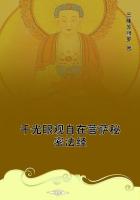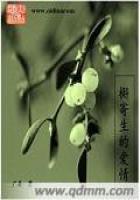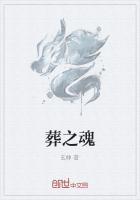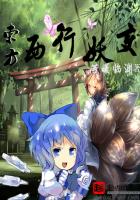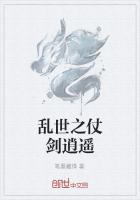Doubtless, he feels the great change of the year, and distinguishes winter from spring; winter as the time of snow and the fireside; spring as the return of grass and flowers, the time of St. Valentine's day and a beating heart. And he feels love after a fashion. Again and again, we learn that Charles of Orleans is in love, and hear him ring the changes through the whole gamut of dainty and tender sentiment. But there is never a spark of passion; and heaven alone knows whether there was any real woman in the matter, or the whole thing was an exercise in fancy. If these poems were indeed inspired by some living mistress, one would think he had never seen, never heard, and never touched her. There is nothing in any one of these so numerous love-songs to indicate who or what the lady was. Was she dark or fair, passionate or gentle like himself, witty or ******? Was it always one woman? or are there a dozen here immortalised in cold indistinction? The old English translator mentions gray eyes in his version of one of the amorous rondels; so far as I remember, he was driven by some emergency of the verse; but in the absence of all sharp lines of character and anything specific, we feel for the moment a sort of surprise, as though the epithet were singularly happy and unusual, or as though we had made our escape from cloudland into something tangible and sure. The measure of Charles's indifference to all that now preoccupies and excites a poet, is best given by a positive example. If, besides the coming of spring, any one external circumstance may be said to have struck his imagination, it was the despatch of FOURRIERS, while on a journey, to prepare the night's lodging. This seems to be his favourite image; it reappears like the upas-tree in the early work of Coleridge: we may judge with what childish eyes he looked upon the world, if one of the sights which most impressed him was that of a man going to order dinner.
Although they are not inspired by any deeper motive than the common run of contemporaneous drawing-room verses, those of Charles of Orleans are executed with inimitable lightness and delicacy of touch. They deal with floating and colourless sentiments, and the writer is never greatly moved, but he seems always genuine. He makes no attempt to set off thin conceptions with a multiplicity of phrases. His ballades are generally thin and scanty of import; for the ballade presented too large a canvas, and he was preoccupied by technical requirements. But in the rondel he has put himself before all competitors by a happy knack and a prevailing distinction of manner. He is very much more of a duke in his verses than in his absurd and inconsequential career as a statesman; and how he shows himself a duke is precisely by the absence of all pretension, turgidity, or emphasis. He turns verses, as he would have come into the king's presence, with a quiet accomplishment of grace.
Theodore de Banville, the youngest poet of a famous generation now nearly extinct, and himself a sure and finished artist, knocked off, in his happiest vein, a few experiments in imitation of Charles of Orleans. I would recommend these modern rondels to all who care about the old duke, not only because they are delightful in themselves, but because they serve as a contrast to throw into relief the peculiarities of their model. When de Banville revives a forgotten form of verse - and he has already had the honour of reviving the ballade - he does it in the spirit of a workman choosing a good tool wherever he can find one, and not at all in that of the dilettante, who seeks to renew bygone forms of thought and make historic forgeries. With the ballade this seemed natural enough; for in connection with ballades the mind recurs to Villon, and Villon was almost more of a modern than de Banville himself. But in the case of the rondel, a comparison is challenged with Charles of Orleans, and the difference between two ages and two literatures is illustrated in a few poems of thirteen lines.
Something, certainly, has been retained of the old movement; the refrain falls in time like a well-played bass; and the very brevity of the thing, by hampering and restraining the greater fecundity of the modern mind, assists the imitation.
But de Banville's poems are full of form and colour; they smack racily of modern life, and own small kindred with the verse of other days, when it seems as if men walked by twilight, seeing little, and that with distracted eyes, and instead of blood, some thin and spectral fluid circulated in their veins. They might gird themselves for battle, make love, eat and drink, and acquit themselves manfully in all the external parts of life; but of the life that is within, and those processes by which we render ourselves an intelligent account of what we feel and do, and so represent experience that we for the first time make it ours, they had only a loose and troubled possession. They beheld or took part in great events, but there was no answerable commotion in their reflective being; and they passed throughout turbulent epochs in a sort of ghostly quiet and abstraction.
Feeling seems to have been strangely disproportioned to the occasion, and words were laughably trivial and scanty to set forth the feeling even such as it was. Juvenal des Ursins chronicles calamity after calamity, with but one comment for them all: that "it was great pity." Perhaps, after too much of our florid literature, we find an adventitious charm in what is so different; and while the big drums are beaten every day by perspiring editors over the loss of a cock-boat or the rejection of a clause, and nothing is heard that is not proclaimed with sound of trumpet, it is not wonderful if we retire with pleasure into old books, and listen to authors who speak small and clear, as if in a private conversation.
Truly this is so with Charles of Orleans. We are pleased to find a small man without the buskin, and obvious sentiments stated without affectation. If the sentiments are obvious, there is all the more chance we may have experienced the like. As we turn over the leaves, we may find ourselves in sympathy with some one or other of these staid joys and smiling sorrows. If we do we shall be strangely pleased, for there is a genuine pathos in these ****** words, and the lines go with a lilt, and sing themselves to music of their own.



